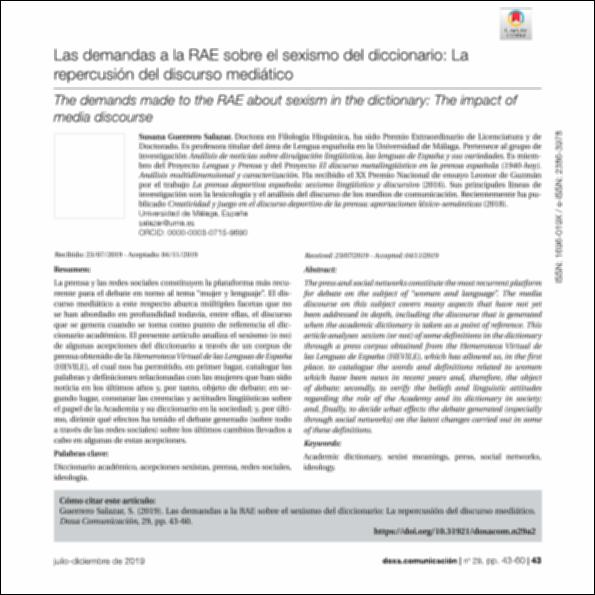Please use this identifier to cite or link to this item:
http://hdl.handle.net/10637/10734Las demandas a la RAE sobre el sexismo del diccionario: la repercusión del discurso mediático

See/Open:
es_a2_stamped.pdf
Español
487,63 kB
Adobe PDF
See/Open:
en_a2_stamped.pdf
English
465,84 kB
Adobe PDF
See/Open:
Articulo_2_ES_Doxa_29_EPUB.epub
Español
624,41 kB
EPUB
See/Open:
Articulo_2_EN_Doxa_29_EPUB.epub
English
614,27 kB
EPUB
| Title: | Las demandas a la RAE sobre el sexismo del diccionario: la repercusión del discurso mediático The demands made to the RAE about sexism in the dictionary: the impact of media discourse |
| Authors : | Guerrero Salazar, Susana |
| Keywords: | Diccionario académico.; Acepciones sexistas.; Prensa.; Redes sociales.; Ideología.; Academic dictionary.; Sexist meanings.; Press.; Social networks.; Ideology. |
| Abstract: | La prensa y las redes sociales constituyen la plataforma más recurrente para el debate en torno al tema “mujer y lenguaje”. El discurso mediático a este respecto abarca múltiples facetas que no se han abordado en profundidad todavía, entre ellas, el discurso que se genera cuando se toma como punto de referencia el diccionario académico. El presente artículo analiza el sexismo (o no) de algunas acepciones del diccionario a través de un corpus de prensa obtenido de la Hemeroteca Virtual de las Lenguas de España (HEVILE), el cual nos ha permitido, en primer lugar, catalogar las palabras y definiciones relacionadas con las mujeres que han sido noticia en los últimos años y, por tanto, objeto de debate; en segundo lugar, constatar las creencias y actitudes lingüísticas sobre el papel de la Academia y su diccionario en la sociedad; y, por último, dirimir qué efectos ha tenido el debate generado (sobre todo a través de las redes sociales) sobre los últimos cambios llevados a cabo en algunas de estas acepciones. The press and social networks constitute the most recurrent platform for debate on the subject of “women and language”. The media discourse on this subject covers many aspects that have not yet been addressed in depth, including the discourse that is generated when the academic dictionary is taken as a point of reference. This article analyses sexism (or not) of some definitions in the dictionary through a press corpus obtained from the Hemeroteca Virtual de las Lenguas de España (HEVILE), which has allowed us, in the first place, to catalogue the words and definitions related to women which have been news in recent years and, therefore, the object of debate; secondly, to verify the beliefs and linguistic attitudes regarding the role of the Academy and its dictionary in society; and, finally, to decide what effects the debate generated (especially through social networks) on the latest changes carried out in some of these definitions. |
| Description: | En: Doxa Comunicación: revista interdisciplinar de estudios de comunicación y ciencias sociales. e-ISSN 2386-3978 n. 29, 2019, pp 43-60. |
| URI: | http://hdl.handle.net/10637/10734 |
| Rights : | http://creativecommons.org/licenses/by-nc-nd/4.0/deed.es |
| Issue Date: | 11-Dec-2019 |
| Center : | Universidad San Pablo-CEU |
| Appears in Collections: | Doxa.Comunicación nº 029 (2019) |
Items in DSpace are protected by copyright, with all rights reserved, unless otherwise indicated.

